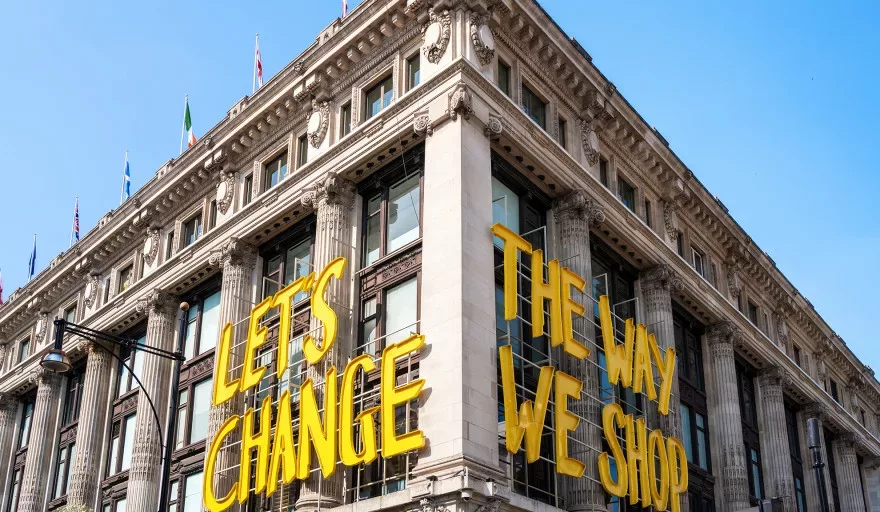Two years into Project Earth, high-end department store chain Selfridges is zeroing in on a circular future for shopping.
CHANGING THE WAY WE SHOP
“In creating our store of tomorrow, we must commit to a fundamental shift in the way that we do business, and use the Selfridges platform for change.”
The words of Andrew Keith, Managing Director of Selfridges, embody the luxury retailer’s vision to reinvent retail, create a more sustainable future, and achieve net zero.
Underpinning the vision of Selfridges, recognised as the world’s best department store an unprecedented four times, is Project Earth.
A bold, evergreen sustainability strategy to change the way we shop, Project Earth was originally launched by Selfridges in 2020 amidst the uncertainty of the COVID-19 pandemic.
The future of retail is circular, and Project Earth builds on more than a decade of retail activism at Selfridges. From banning fur in 2005 to removing all plastic-based cosmetic glitter from its stores in 2021, sustainability is very much central to the business today.
Project Earth evolved from Project Ocean, a long-term partnership with the Zoological Society of London launched in 2011 to help protect our oceans from overfishing and plastic pollution.
Designed to apply to issues more material to Selfridges’ operations and customer experience, Project Earth aims to pioneer a new approach to business, and leverage the Selfridges platform to engage customers.
“We recognise that we need to challenge ourselves to accelerate change, and our ambitious circular and materials targets do just that,” a statement from Keith reads.
“We don’t have all the answers, but we are committed to finding solutions through a continued imaginative approach to retail innovation. The scale of our ambitions cannot be underestimated, but we are inspired by what lies ahead and how we can bring this to life for our customers.”
GENUINE TRANSFORMATION
Moving beyond incremental change, the intention of Project Earth is to drive genuine transformation through three key pillars: materials, models, and mindsets.
Materials matter to Selfridges, as they are responsible for a significant percentage of the company’s overall environmental impact. For this reason, Selfridges is calling for a materials revolution to accelerate its drive towards a net zero future.
By 2025, the most environmentally impactful materials will come from certified, sustainable sources as part of a shift to a new materials culture, one in which brands and suppliers are transparent and responsible in their sourcing practices.
Everything built, bought and sold by Selfridges will also meet environmental and ethical standards by the end of the decade, according to Project Earth, thus making both products and procurement more resilient and sustainable.
Likewise, by investing in alternative shopping models that focus on extending the life of existing products and packaging, Selfridges is putting circular at the heart of its revenue streams and customer experience. Indeed, 45 percent of Selfridges transactions across its four stores and online will come from circular products and services by 2030.
Selfridges recognises that reducing the impact of its products and operations will only get it so far, and that it has to pioneer new business models if the company is truly going to achieve its net zero goal.
Changing the mindsets of teams, communities and customers, meanwhile, will enable Selfridges to build an inclusive retail culture that puts people and the planet first in every decision.
Together, these three pillars will contribute to the company’s commitment to achieve net zero carbon emissions by 2040, accelerated last year by Selfridges as a signatory to the Climate Pledge.
Project Earth is Selfridges’ route to achieving a sustainable future for its teams and customers, an evolving approach informed by regular assessment of its material issues and the most effective ways to address those issues.
TANGIBLE PROCESS
Two years on from the proud launch of the project, Selfridges recently shared its first Project Earth Report, detailing the progress made so far during the initiative and setting out the next steps in its plans to reinvent retail and create a sustainable future.
To meet its 2025 material commitments, the report details how Selfridges tracked the materials coming into its business to establish a baseline volume of products. The report also notes that Selfridges’ Project Earth edit featured over 55,000 more sustainable products and accounted for more than 12 percent of all own-bought sales in 2021.
Two further material commitments have been set, namely for 50 percent of polyester and nylon used across the business and in products sold to come from certified recycled sources by 2025 and 2027, respectively.
Selfridges has also become more synonymous with circularity through pioneering new retail models and experiences, with the ‘Reselfridges’ initiative now housing all circular models and forming the backbone of the company’s future business to change the way we shop.
Sales of pre-loved items through Reselfridges have increased by an impressive 240 percent, the report reveals, whilst over 28,000 repairs have been facilitated, more than 2,000 items have been rented, and in excess of 8,000 refills have been sold by Selfridges.
Customer awareness of sustainability initiatives at Selfridges has grown exponentially in the last five years from 11 percent to 52 percent. However, research also shows that half of Selfridges customers want to make more sustainable choices but don’t know how to.
As such, to help and inspire customers, one initiative that Selfridges will offer is dedicated Project Earth appointments, to discover how to restyle existing wardrobe pieces, explore earth-conscious beauty, and learn about sustainable denim.
Building on the previous two years, Selfridges’ 12-week creative scheme in Spring 2023 will creatively and collaboratively explore the ambitions of Project Earth, with a continued imaginative approach to retail innovation.
Through materials, models and mindsets, Selfridges and Project Earth are embedding and accelerating change.

































